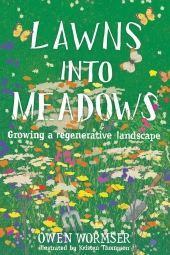Hi Zac. You'll want to read
Paul's article on lawn care. It covers everything you're talking about.
In short, there are a number of ways to handle lawncare. A permacultural approach will involve choosing lawn plant species that are better-suited to where you're growing them than the "weeds" you wish to control, such that what you want will out-compete what you don't want. In addition, it involves combining a number of suitable plants to simulate an ecosystem of sorts, where all the biological actors are in play, so your lawn manages itself like a meadow might.
You might be surprised that many among us prize dandelions as breakers-up of hardpan and deep miners of soil minerals and nutrients, as well as one of the earliest foods available for pollinators. Oftentimes, non-grass plants that are targeted by commercial poisons actually find their ways into our lawns to fix problems with the soil system there. As long as the plants involved aren't prickly or poisonous, or a medical hazard like poisons oak, ivy, and giant hogweed, to mention a few, they are not only usually fixing a problem, but also taking up a space that could otherwise be occupied by something worse. In that, close-cut grass is at a severe disadvantage, as it is often mowed too closely, exposing the soil seedbank to the sun it needs to germinate and obviating the possibility of shading anything out.
But have a good read, let us know what you think, and good luck. There are many knowledgeable and experienced people on this site that love to help.
-CK
A human being should be able to change a diaper, plan an invasion, butcher a hog, conn a ship, design a building, write a sonnet, balance accounts, build a wall, set a bone, comfort the dying, take orders, give orders, cooperate, act alone, solve equations, analyze a new problem, pitch manure, program a computer, cook a tasty meal, fight efficiently, die gallantly. Specialization is for insects.
-Robert A. Heinlein









